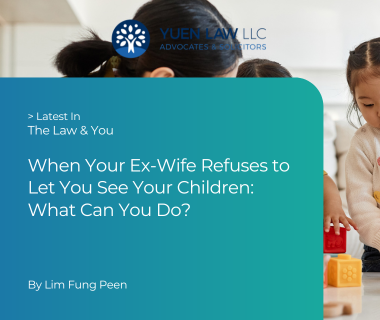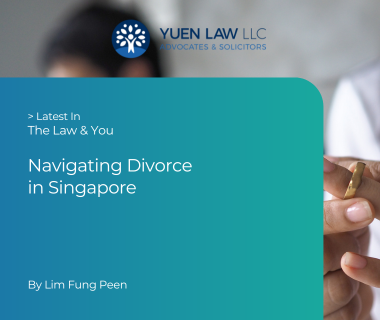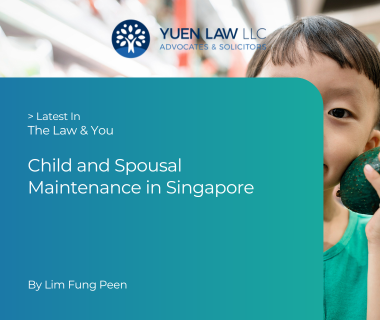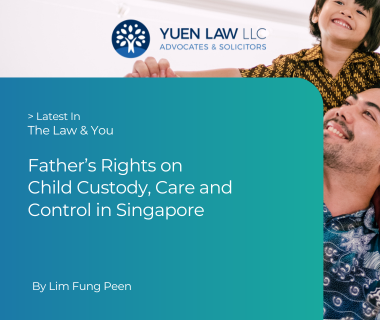In this Article
Latest News! 📢
Starting 1 July 2024, couples in Singapore will be able to cite mutual agreement as a ground for divorce. Read this article to find out what you need to know about this new law.
The introduction of Divorce by Mutual Agreement under Section 95 of the Women’s Charter is a welcome and significant change in divorce law, designed to foster an amicable and collaborative process that reduces acrimony (particularly for children), helping families to move forward in a positive way through a no-fault divorce. A Divorce by Mutual Agreement promotes access to justice by providing couples with a more accessible and less adversarial process for divorce.
It allows couples to initiate divorce proceedings without blaming each other for the breakdown of marriage. Both spouses must agree that their marriage is over and cannot be reconciled, leaving divorce as the only option to move forward with their individual lives.
Divorce by mutual agreement (DMA) can be used by couples under both the simplified track and the normal track, as long as they are not contesting the divorce.
Six Grounds for Divorce in Singapore
Before the introduction of Divorce by Mutual Agreement, couples were only able to get a divorce with proof of the marriage’s irretrievable breakdown through one of the five grounds of:
- Unreasonable Behavior
- Adultery
- Desertion of at least 2 years
- Separation of at least 3 years with Consent
- Separation of at least 4 years without Consent
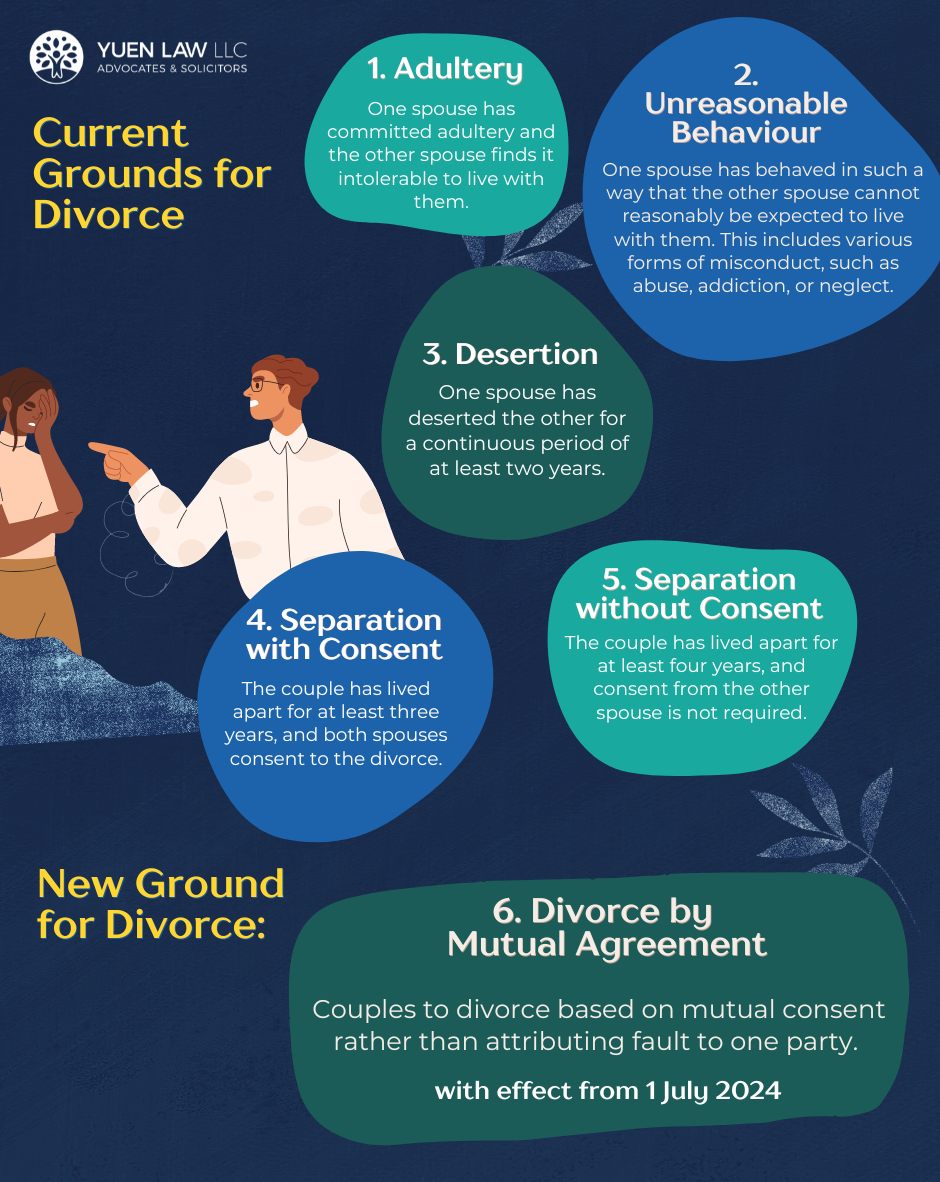
Distinction Between Divorce by Mutual Agreement and Other Divorce Options
- Divorce by Mutual Agreement
Under this ground, couples can apply for an amicable divorce based on mutual consent rather than attributing fault to one party. This is particularly beneficial for married couples who agree and can demonstrate to the Court that their marriage has irretrievably broken down.
Benefits of Divorce by Mutual Agreement
Reduced Legal Fees & Court Involvement
Traditionally, divorce proceedings can be lengthy and costly, often requiring extensive litigation required to establish fault or misconduct of one party as the grounds of divorce. However, by allowing couples to agree mutually on the grounds of divorce without assigning blame (making it a no-fault divorce), can shorten the duration of legal proceedings. This leads to a more efficient process and reduced legal costs.
Streamlining Legal Proceedings
Divorce by Mutual Agreement is the fastest way to divorce. It simplifies the process through a fast-track option, known as the simplified track. Couples who have agreed on ancillary matters through private negotiations or mediation may request that the divorce proceedings be dealt with on a simplified hearing track.
Encourages Amicable Resolutions between Couples
Divorce by Mutual Agreement fosters a collaborative approach, allowing couples to file as joint applicants, making divorce proceedings less acrimonious. This can help preserve any remaining aspects of an already strained relationships.
DMA Encourages Co-Parenting Through the Mandatory Co-Parenting Programme (CPP)
Divorce can have a significant emotional impact on children, often leading to considerable emotional distress. Couples divorcing under the Divorce by Mutual Agreement will undergo the Mandatory Co-Parenting Programme if they have a child below 21 years old, where they will receive support in understanding the impact of a divorce on their children and support in making informed decisions that prioritise the well-being of children in a one-on-one confidential setting with a counsellor, for up to 3 consultation sessions. This will better equip couples with the skills and knowledge needed to help their family adjust post-divorce. When the couple files for divorce, they would need to provide the Court with a Parenting Plan.
Psychological and Emotional Benefits
Battling over who caused the breakdown of a marriage is one of the biggest stresses in any divorce. Unlike fault-based divorce, Divorce by Mutual Agreement allows couples to agree on the reasons for the breakdown of marriage and quickly move on to determining ancillary matters. This approach enables spouses to move forward, creating space to focus on post-divorce arrangements, co-parenting, and financial affairs.
Enhancing Access to Justice
Divorce by Mutual Agreement offers a more accessible, dignified solution by resolving the grounds for divorce upfront. In challenging circumstances, parties often prefer to allocate their legal budget toward more critical issues. With the grounds for divorce already settled, the number of disputes is reduced, allowing lawyers to focus their legal advice on important post-divorce arrangements, such as care and control, access, and maintenance, ensuring that their clients rights are protected.

Misconception of Divorce by Mutual Agreement
The term “mutual agreement” can be misleading, as it may suggest that a Divorce by Mutual Agreement offers couples an easy way out of their marriage. This is certainly not true, couples will need to provide a detailed agreement and explain why they have conclude that their marriage had irretrievably broken down.
The Court’s Role and Discretion in Divorce by Mutual Agreement Applications
The Court ultimately has discretion whether or not to dissolve the marriage and will reject applications where it believes that there is a reasonable chance of reconciliation.
The Court will consider factors such as how long the couple has been separated, whether they have tried counselling. If the Court can also direct the couple to various programmes or to counsellors within the Family Justice Court.
Requirements of a Divorce by Mutual Agreement
To file for a divorce by mutual agreement, couples must meet the following criteria:
Mutual Consent
Both parties must agree on the reason for the marriage breakdown, as well as all issues related to children and the division of assets.
Minimum Marriage Duration of 3 Years
Couples must have been married for at least three years before filing for divorce. This is true, even if couples decide to proceed on Divorce by Mutual Agreement.
Residency Requirement
At least one spouse must be a Singapore citizen, or residing in Singapore for at least three years before filing for divorce.
Necessary Legal Documentation
Documents such as a mandatory written settlement agreement, marriage certification and copies of NRICs or passports must be submitted.
Statements Needed for a Divorce by Mutual Agreement
A mandatory written agreement will need to be drawn up and should include the following matters:
Reasons for Parties to Conclude Marriage has Irretrievably Broken Down
Even with Divorce by Mutual Agreement, couples must explain the reasons leading them to conclude that the marriage had irretrievably broken down. For example, they might cite a loss of love and growing apart, deep-seated differences in values, cultural differences or constant arguing.
Efforts Made by Couple to Reconcile
Couples must also explain efforts they have taken to attempt to reconcile the marriage. For example, they may have attended marriage counselling sessions together, or have organised and participated in activities together. If the court believes that reconciling the relationship is possible, it may reject the application and redirect the spouses to marriage counselling.
Care Arrangements of Children & Financial Arrangements
The Family Justice Court is highly concerned about children’s welfare. Couples must inform the court of their discussions about the division of matrimonial assets and care and financial arrangements for children. If arrangements have been mutually agreed upon, precise details should be provided in their application.
How a Specialist Divorce Lawyer Can Help
Even when couples agree to pursue a Divorce by Mutual Agreement (DMA) and have settled all terms, having your own divorce lawyer can be highly beneficial. Your lawyer plays a crucial role in ensuring that you understand your rights and fully grasp the implications of the settlement terms, particularly regarding asset division and childcare arrangements. Having legal guidance not only prevents oversights and misunderstandings, but also can help to prepare parties for any potential future contingencies to reduce the likelihood of needing to return to Court. This guidance not only prevents oversights and misunderstandings but also prepares parties for any potential future contingencies.
Ultimately, engaging a lawyer can help you streamline the process, reducing stress while minimizing time and cost.
The Reasons for the Introduction of Divorce by Mutual Agreement
Concept of Joint Responsibility in Divorce by Mutual Agreement
Children are innocent parties involved in an unfortunate situation, and the Singapore Courts want to minimise children’s exposure to the pain and conflict that often accompany divorce. The government views Divorce by Mutual Agreement as a means for couples to take joint responsibility for their marriage outcomes, potentially leading to more amicable dissolution of marriage. This approach aims to reduce adversarial court proceedings, encouraging couples to work together on post-divorce arrangements, including co-parenting and financial affairs.
Shaping the Future of Divorce Proceedings in Singapore
The future of divorce in Singapore is evolving towards a more therapeutic and cooperative model. This holistic approach, championed by the Family Justice Court and envisioned by Justice Debbie Ong seeks to minimize acrimony and maximize cooperation between divorcing parties. The focus on co-parenting and providing children with a voice through court counselling and support schemes like the CPP is crucial in helping families adjust post-divorce.
Frequently Asked Questions
Under the Legal Professional Rules, lawyers are not to put selves in a position of a conflict of interest so that they cannot act for both spouses going through a Divorce by Mutual Agreement (DMA).
It does not mean each spouse has to get their own lawyers, but it means that one lawyer cannot advise or represent both spouses as they have different rights and concerns which might not be aligned.
Yes, you can still apply for a divorce. However, if your spouse does not agree to the divorce or its terms, your application will proceed as a contested divorce.
An uncontested divorce with all terms of the divorce terms pre-agreed takes about 4-5 months. Contested divorces take anywhere from 6 months to 1.5 years or more depending on how hotly contested the issues are.
Get In Touch
For more information or legal assistance regarding divorce by mutual agreement, please contact:
Lim Fung Peen
Director and Head of Private Wealth & Family Practice Group
T: +65 6536 6037
E: fungpeen@yuenlaw.com.sg
View Fung Peen’s bio here.


